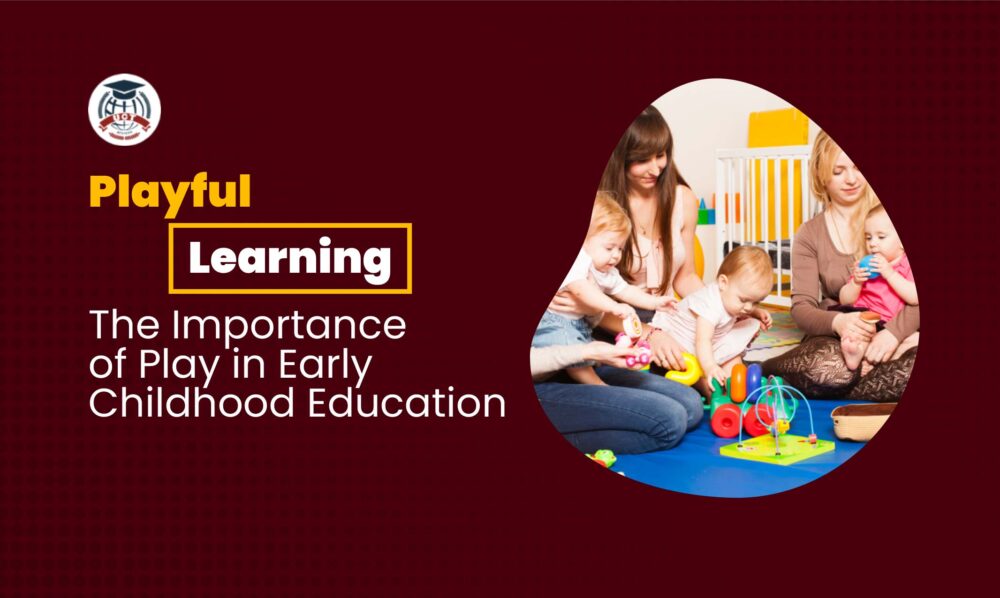Playful Learning: The Importance of Play in Early Childhood Education

Play-Based Learning in Early Childhood Development & Childcare Training
Overview:
In the enchanting world of early childhood education, where each moment is a canvas for growth and discovery, the concept of play transcends the conventional boundaries of entertainment. It emerges as a profound and transformative force, intricately woven into the fabric of a child’s development. This comprehensive exploration delves into the significance of play-based learning, navigating through the realms of early childhood development, childcare training, and the intricate landscape of child psychology.
Play, often dismissed as a simple childhood activity, takes center stage as the catalyst for cognitive, social, and emotional advancements. As we embark on this journey, the intertwined threads of education and play unravel, revealing a dynamic tapestry where each playful interaction becomes a cornerstone in the construction of a child’s future. Join us in this captivating odyssey through the realms of early childhood, where play is not merely a pastime but a powerful vehicle for holistic learning and growth.
I. Early Childhood Development: The Crucible of Growth (300 words)
Early childhood development is akin to a delicate dance, where every interaction and experience molds the evolving persona of a child. Explore the foundational principles of early childhood development, where play serves as the crucible of growth, fostering cognitive, social, and emotional advancements.
II. Childcare Training: Nurturing the Nurturers (300 words)
Childcare training is the compass guiding educators and caregivers through the intricate paths of early education. Much like skilled navigators, trained professionals ensure that play-based learning aligns with the principles of safety, engagement, and developmental milestones.
III. Early Learning Curriculum: Crafting the Playful Symphony (300 words)
The early learning curriculum is the sheet music that orchestrates the playful symphony of education. Picture it as a carefully composed melody, where play seamlessly integrates with cognitive exercises, imaginative activities, and social interactions, creating a harmonious educational experience.
IV. Child Health and Safety: A Playground of Well-being (300 words)
Child health and safety are the pillars that uphold the playground of early education. Similar to vigilant guardians, educators and caregivers implement safety measures while ensuring that play activities contribute positively to a child’s physical and emotional well-being.
V. Child Psychology: Unraveling the Playful Mind (300 words)
Child psychology is the key to unlocking the mysteries of the playful mind. Like skilled detectives, educators and psychologists observe and interpret play behaviors, gaining valuable insights into a child’s thoughts, emotions, and developmental needs.
VI. Play-Based Learning: The Alchemy of Education (300 words)
Play-based learning is the alchemy that transforms ordinary moments into profound educational experiences. Picture it as a magical potion, where play becomes a catalyst for acquiring knowledge, problem-solving skills, and social competence, laying the foundation for future academic success.
VII. Observation and Assessment: Capturing the Playful Journey (300 words)
Observation and assessment are the lenses through which educators capture the essence of a child’s playful journey. Similar to skilled photographers, they document and analyze play-based interactions, tailoring educational approaches to suit individual needs and developmental progress.
VIII. Family Engagement: Weaving Bonds through Play (300 words)
Family engagement is the tapestry that weaves together the worlds of home and school. Much like skilled storytellers, educators involve families in the play-based learning narrative, fostering a collaborative environment that extends the benefits of playful education beyond the classroom.
IX. Holistic Childcare Approach: Nurturing Mind, Body, and Soul (300 words)
A holistic childcare approach is the nurturing embrace that encompasses mind, body, and soul. Similar to cultivating a garden, educators and caregivers provide an environment where play contributes to the overall well-being of a child, fostering not just academic growth but emotional and physical health.
X. Regulatory Compliance in Childcare: The Rulebook of Safety (300 words)
Regulatory compliance in childcare is the rulebook that ensures a safe and structured play environment. Much like responsible guardians, educators adhere to guidelines, creating a space where play flourishes within the boundaries of safety and ethical practices.
As we conclude our exploration into the vibrant landscape of play-based learning in early childhood education, we find ourselves standing amidst the echoes of laughter, imagination, and profound growth. This journey has been a testament to the transformative power of play, transcending the conventional notion of entertainment to become a cornerstone in the educational realm. From the delicate dance of early childhood development to the vigilant guardianship of child health and safety, the play has woven its magic into every facet of a child’s formative years. It has emerged not only as a source of joy but as a catalyst for cognitive, social, and emotional advancements.
Conclusion:
Observing the playful minds of children and engaging in a holistic childcare approach, educators become architects of an environment where every interaction contributes to the holistic development of a child—mind, body, and soul. Family engagement becomes not just a collaboration between home and school but a weaving of bonds that strengthen the foundation of a child’s growth. Regulatory compliance, often viewed as a set of rules, transforms into a framework that ensures a safe and nurturing play environment. Within these boundaries, the magic of play unfolds, fostering not just academic growth but emotional resilience, social competence, and the joy of learning.
As we step away from this exploration, let the importance of play in early childhood education linger in our minds as a reminder that every playful interaction holds the potential to shape a child’s future. Play is more than a pastime; it is the canvas on which a child’s imagination paints the colors of curiosity, resilience, and a lifelong love for learning. May the echoes of playful laughter resonate through the corridors of education, reminding us that in the world of early childhood, play is not just a tool; it is the heartbeat of growth and discovery.

